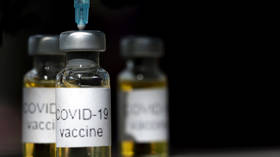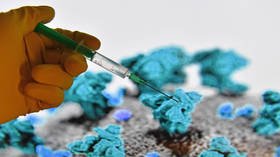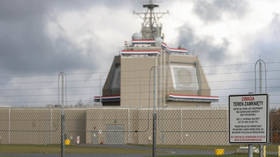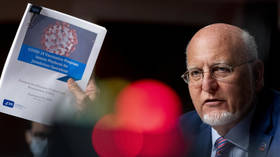All volunteers in Russian Covid-19 trials in good health as tests suggest new drug 'Avifavir' capable of suppressing virus

Some good news in the fight against coronavirus. A vaccine trial in Novosibirsk has reported that none of its participants have suffered side effects. Meanwhile, a new Russian medicine appears to be effective against Covid-19.
All volunteers inoculated by the Vector State Research Center of Virology and Biotechnology, in the Siberian capital, are in good health, it was announced on Tuesday. Shortly afterwards. Russian medics revealed the results of the pilot part of phases two and three of clinical trials of Avifavir, a domestic favipiravir-based drug capable of suppressing the coronavirus.
Avifavir accelerated the removal of the coronavirus from the body in more than half of the patients involved, and caused no serious side effects, the scientists wrote in their article published in the medRxiv electronic library.
“The pilot part of our randomized and open clinical trials demonstrated that Avifavir possesses rapid antiviral action. It eliminated the virus in four days in 62.5 percent of patients. Soon, we will study how different dosages influence the rate of recovery,” the researchers explained.
In the vaccine testing trial, three volunteers out of five have already been inoculated. The fourth will be vaccinated on August 5. The volunteers remain under constant medical observation and, so far, no situations requiring medical intervention have arisen. The five volunteers, aged 18 to 30, are participating in the first stage of the clinical trials. They enter the study in turns, in a ‘stop-time’ regime with 72-hour intervals.
“All vaccinated volunteers are in good health. No complications after the inoculation with the EpiVacCorona vaccine against the coronavirus have been recorded,” the Federal Service for Surveillance on Consumer Rights Protection and Human Wellbeing told the TASS news agency.
“Double vaccination after 21 days is planned. The vaccine should facilitate the development of immunity against the coronavirus infection after double administration with a 21-day interval. The data collection on the antibody levels will begin after the first inoculation,” the officials explained.
Avifavir is a Russian version of the favipiravir flu medicine that was developed in Japan. At the end of May, it received a registration certificate from Russia’s Health Ministry and on June 3, was included on the list of drugs used to fight coronavirus.
The researchers report that 60 volunteers infected with Covid-19 and suffering from pneumonia and other symptoms participated in the trials. They were divided into three groups: one received a placebo, while the other two were given two different dosages of Avifavir.
All patients were simultaneously taking anticoagulants, antibiotics, and other drugs to lessen the symptoms of the coronavirus infection.
The subsequent observations of their health demonstrated that, on the fourth day of treatment, the virus disappeared in approximately 62.5 percent of patients given Avifavir, but in only 30 percent of cases in the control group.
By the tenth day of treatment, traces of SARS-CoV-2 were not registered in 90 percent of medicated volunteers, and in 80 percent of the placebo group. Similar positive changes were recorded in body temperature and observed in sectional lung imaging, with no serious side-effects being reported in all cases with the exception of nausea and dizziness, which are characteristic of favipiravir as well.
The results of these pilot observations will help the researchers conduct full clinical trials quickly and efficiently, with the hope that they will confirm the effectiveness and safety of the drug and open the way for its practical use.
Also on rt.com How did Russia get a possible Covid-19 vaccine so fast? It took decades of research & won't be for political gain says scientistLike this story? Share it with a friend!














